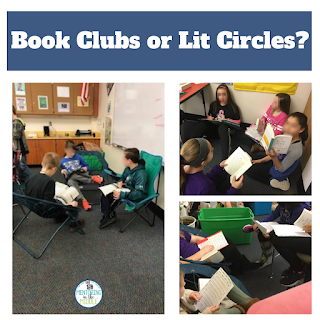This is the time of year when many ELA teachers are looking to get students into books. Do you run a Literature Circle? Or a Book Club?
Literature Circles
Literature Circles are small groups of students who choose the same book to read together. Each member of the group has a specific role to play. The roles you choose for the group help determine the direction you want the group to go in.
🔦I like to compare Literature Circles to working on a project together. Every student has a specific task and they come together to create something really interesting. They can learn a lot from each other because each person is approaching their task from a different perspective.
📌You can assign students their roles for the entire time or have them switch up each time they meet. That really depends on the age of your students and how well they collaborate.These are some of the roles you can use:
- Discussion director - comes up with questions for the others to discuss, things this person found interesting.
- Word Wizard - finds interesting or unfamiliar words and helps students figure their meanings out
- Summarizer - summarizes the main ideas behind the chapter or part read
- Connector/Connections Maker - makes connections about the book to other books, events in the world, or to themself
- Character Analyzer - looks at character traits and how characters grow or change through the course of the book
- Travel Tracer/Monitor - if it applies to the book, this can be a fun way to look at maps and build some background knowledge about locations around the world.
- Illustrator - illustrates a scene from the chapter that struck them as visually rich
- Time Keeper/Coach - keeps everyone on task and makes sure everyone has a chance to join in the conversation
- Predictor/Inferer - if this is a skill you're working on, you might want to have someone make some predictions and inferences
📌This list contains more roles than a typical group should have. I like to keep my groups to no more than 5 students, so you would need to choose which Literature Circle roles you want students to have.
Book Clubs
There are several ways that you can run book clubs and again, your decision should be based on how collaboratively and critically your students approach their tasks.
As a rule, book clubs are a bit more informal, where students come together to discuss the book and initiate and keep the conversation going. But these are sixth graders, so that's asking a lot.
🔦I like to compare Book Clubs to a group of students talking about a movie they've recently seen. Each person brings a different perspective, based on their personal experiences, and everyone has an equal chance to speak. That being said, I've had some groups that have worked effectively together and others that have not.
📌When that happens, I try to have discussion questions ready for the book they're reading. The questions get them started and they usually can go from there.
- I have many resources with chapter questions or book study guides if you're interested.


No comments
Post a Comment